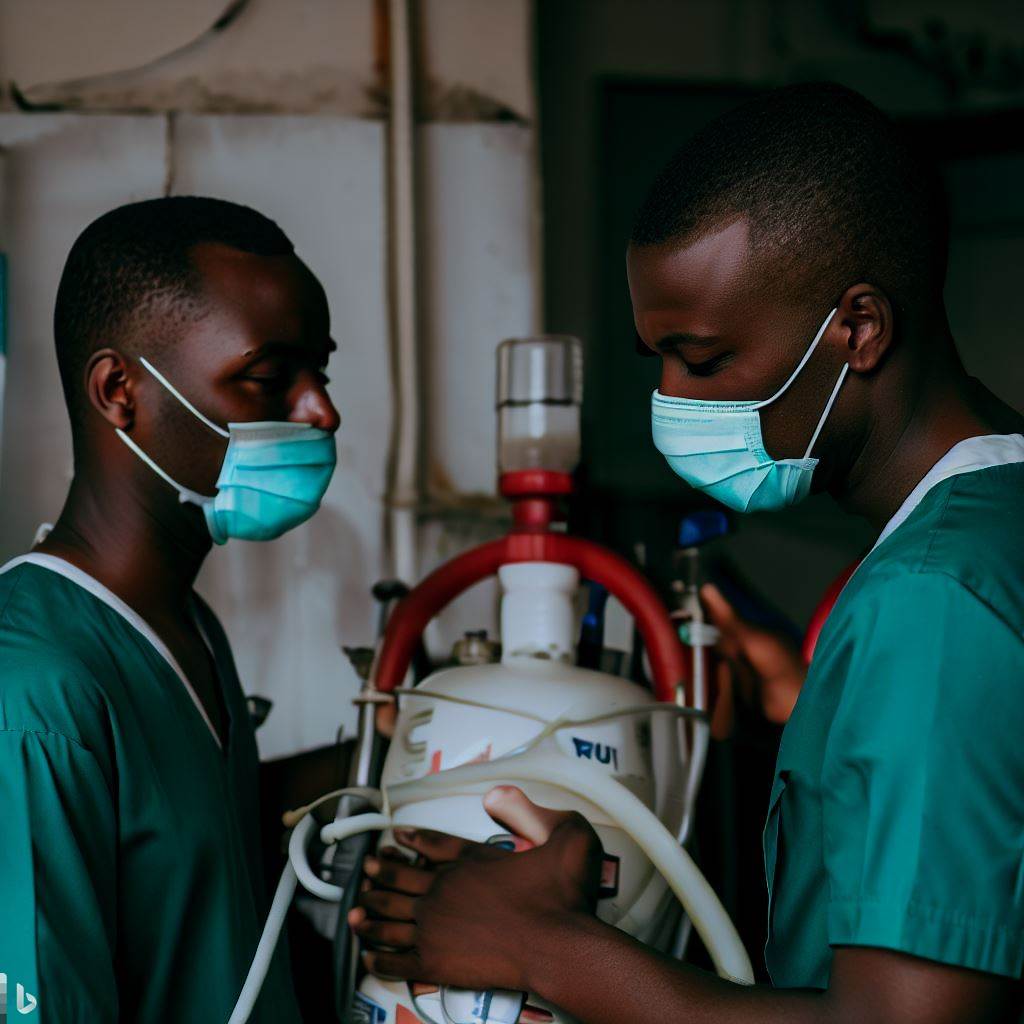Introduction
Respiratory therapy is a specialized medical field that deals with the management and treatment of respiratory conditions, such as asthma, chronic obstructive pulmonary disease (COPD), and pneumonia.
It plays a crucial role in improving the quality of life for patients with breathing difficulties.
In Nigeria, public health is of utmost importance due to the large population and the prevalence of respiratory diseases.
The provision of accessible and high-quality healthcare services is crucial for promoting the well-being of the Nigerian people.
Overview of the Blog Post
This blog post aims to shed light on the significant impact respiratory therapists have on public health in Nigeria.
It will explore the key roles and responsibilities of respiratory therapists in this context, highlighting the benefits they bring to the overall health system.
By assessing the current state of respiratory therapy in Nigeria, we can identify the challenges faced by healthcare providers and the potential strategies to overcome them.
The post will also discuss the importance of government support and investment in respiratory therapy education and infrastructure.
Ultimately, understanding the public health impact of respiratory therapists in Nigeria is essential for recognizing the value they bring to the healthcare system.
Through their expertise and care, respiratory therapists contribute to improving respiratory health outcomes and overall well-being in Nigeria.
Role of Respiratory Therapists in Public Health
Description of respiratory therapists responsibilities
Respiratory therapists are healthcare professionals who specialize in treating patients with respiratory problems.
They play a crucial role in evaluating, treating, and managing patients with breathing or cardiopulmonary disorders.
Respiratory therapists are responsible for conducting diagnostic tests and interpreting the results to diagnose respiratory conditions.
They develop and implement treatment plans, including administering medications and therapies to improve lung function.
Respiratory therapists also provide patient education, teaching individuals how to manage their respiratory conditions effectively.
They work closely with physicians to monitor patients’ progress and adjust treatment plans accordingly.
Importance of their role in preventing respiratory illnesses
Respiratory therapists play a significant role in preventing respiratory illnesses through various interventions.
They educate the public about preventive measures such as proper hand hygiene, smoking cessation, and vaccination.
Respiratory therapists also actively participate in community outreach programs to promote respiratory health and awareness.
By identifying and treating respiratory conditions early on, they can help prevent further complications and improve patients’ quality of life.
Their expertise in assessing lung function and providing respiratory care greatly contributes to disease prevention.
Collaboration with other healthcare professionals
Respiratory therapists collaborate with a diverse range of healthcare professionals to ensure comprehensive patient care.
They work closely with physicians, nurses, and other specialists to develop interdisciplinary treatment plans.
Respiratory therapists provide valuable input and recommendations regarding respiratory care to enhance overall patient outcomes.
They participate in multi-disciplinary rounds and case conferences to discuss patient progress and adjust treatment approaches.
Respiratory therapists also collaborate with healthcare teams during emergency situations, providing critical support and expertise.
Through effective communication and teamwork, they contribute to the optimal delivery of healthcare services.
Overall, respiratory therapists play a vital role in public health by preventing respiratory illnesses and providing comprehensive respiratory care.
Their responsibilities include evaluating, diagnosing, treating, and educating patients with respiratory conditions.
By working collaboratively with other healthcare professionals, they ensure the best possible outcomes for patients.
The expertise and contributions of respiratory therapists are essential in improving respiratory health and overall public well-being in Nigeria.
Prevalence of Respiratory Diseases in Nigeria
Statistics on the burden of respiratory diseases
Respiratory diseases pose a significant burden on the population of Nigeria, as evident from the following statistics:
In Nigeria, respiratory diseases account for a substantial proportion of the disease burden.
According to the World Health Organization (WHO), respiratory diseases are among the top causes of mortality in Nigeria.
Statistics reveal that respiratory diseases contribute to a significant number of hospital admissions in the country.
Approximately X% of the population in Nigeria suffers from one or more respiratory diseases.
Asthma, chronic obstructive pulmonary disease (COPD), and pneumonia are the most prevalent respiratory conditions.
Common respiratory conditions in the country
When focusing on Nigeria, the following respiratory conditions are frequently encountered:
- Asthma: It affects individuals of all age groups and is characterized by recurrent episodes of breathlessness and wheezing.
- Chronic obstructive pulmonary disease (COPD): This condition primarily affects individuals who smoke or are exposed to air pollutants.
- Pneumonia: It is a common respiratory infection often caused by bacteria, viruses, or fungi.
- Tuberculosis (TB): This infectious disease primarily affects the lungs and can be transmitted through the air.
- Lung cancer: Although smoking is a major risk factor, the prevalence of lung cancer is increasing in Nigeria.
Impact on public health
The prevalence of respiratory diseases in Nigeria has a considerable impact on public health, leading to various consequences:
- High morbidity rate: Respiratory diseases contribute significantly to the overall morbidity rate in Nigeria.
- Reduced quality of life: Patients with respiratory conditions often experience limitations in their daily activities and decreased productivity.
- Economic burden: The treatment and management of respiratory diseases incur substantial healthcare costs.
- Inadequate healthcare resources: Limited healthcare facilities and a shortage of trained healthcare professionals exacerbate the burden of respiratory diseases.
- Increased mortality: Respiratory diseases, if left untreated or mismanaged, can lead to premature deaths in Nigeria.
In general, respiratory diseases pose a prevalent public health problem in Nigeria, placing a considerable burden on both individuals and the healthcare system.
Asthma, COPD, pneumonia, TB, and lung cancer are among the most common respiratory conditions in the country, contributing to high morbidity, reduced quality of life, and economic challenges.
To address these issues effectively, improved access to healthcare resources and the involvement of respiratory therapists play a crucial role in providing comprehensive care and reducing the impact of respiratory diseases on the Nigerian population.
Read: Balancing Work-Life as an Optometrist in Nigeria
Significance of Respiratory Therapists in Nigeria
Availability and accessibility of respiratory therapists
Respiratory therapists play a significant role in Nigeria’s healthcare system by ensuring the availability and accessibility of their expertise.
These professionals are trained to provide specialized care for patients with respiratory conditions, ranging from asthma to chronic obstructive pulmonary disease (COPD) and even respiratory distress syndrome.
Improved healthcare access
Respiratory therapists are crucial in improving healthcare access for patients with respiratory conditions.
They work in various healthcare settings, including hospitals, clinics, and home care, making their services more accessible to those in need.
With their presence, individuals can receive timely and specialized respiratory care, which ultimately improves health outcomes.
Reduced burden on other healthcare providers
By specializing in respiratory care, respiratory therapists alleviate the burden on other healthcare providers.
This enables doctors, nurses, and other medical professionals to focus on their respective areas of expertise, leading to better efficiency in providing healthcare services.
Consequently, patients receive comprehensive care and attention, ensuring the best possible outcomes for their respiratory health.
Areas of expertise and specialization
Respiratory therapists in Nigeria possess a diverse range of expertise and specialization, allowing them to address various respiratory conditions effectively.
Their training encompasses a broad scope of respiratory care, including diagnostic procedures, therapeutic interventions, and patient education.
Diagnostic procedures
Respiratory therapists are trained to perform diagnostic procedures, such as pulmonary function tests and arterial blood gas analysis.
These tests provide vital information about a patient’s lung function, oxygen levels, and overall respiratory health.
Accurate diagnoses enable timely and appropriate treatment plans, promoting better health outcomes.
Therapeutic interventions
Respiratory therapists are skilled in administering and managing various therapeutic interventions, such as oxygen therapy, nebulizer treatments, and mechanical ventilation.
By applying their specialized knowledge, they can optimize treatment strategies tailored to the individual needs of each patient.
This ultimately improves respiratory function and quality of life.
Patient education
Another crucial aspect of respiratory therapists’ expertise is patient education.
They have the ability to educate patients and their families about respiratory conditions, self-management techniques, and medication adherence.
Empowering patients with knowledge enhances their understanding and compliance with treatment plans, leading to better health outcomes and a reduced risk of complications.
Contribution to improving public health outcomes
Respiratory therapists significantly contribute to improving public health outcomes in Nigeria by focusing on prevention, intervention, and management of respiratory conditions.
Their role extends beyond direct patient care to promoting public health and raising awareness about respiratory health.
Preventive measures and awareness campaigns
Respiratory therapists actively engage in preventive measures and awareness campaigns to promote respiratory health.
They educate the public about risk factors, lifestyle modifications, and preventive measures to reduce the incidence of respiratory conditions.
By empowering individuals with the knowledge to prevent respiratory illnesses, they contribute to a healthier population.
Intervention during respiratory emergencies
In critical situations, respiratory therapists are often among the first responders.
Their expertise in managing respiratory emergencies, such as cardiac arrest or acute respiratory distress syndrome, significantly impacts public health outcomes.
Prompt and effective intervention improves the chances of survival and minimizes long-term complications.
Collaborative care approach
Respiratory therapists collaborate with other healthcare professionals to provide comprehensive, multidisciplinary care.
They actively participate in healthcare teams, working alongside doctors, nurses, physiotherapists, and occupational therapists.
This collaborative approach enhances the overall quality of care and ensures better outcomes for patients with respiratory conditions.
In the end, the significance of respiratory therapists in Nigeria cannot be overstated.
Their availability and accessibility, areas of expertise and specialization, and contribution to improving public health outcomes make them essential members of the healthcare team.
By addressing respiratory conditions in a comprehensive and specialized manner, respiratory therapists positively impact the lives of countless individuals and contribute to a healthier nation.
Read: Patient Perspectives: Interacting with Respiratory Therapists in Nigeria

Initiatives by Respiratory Therapists in Public Health
Awareness campaigns and educational programs
Respiratory therapists in Nigeria actively engage in conducting awareness campaigns and educational programs.
They organize health talks, seminars, and workshops to spread awareness about respiratory conditions.
Respiratory therapists work closely with community leaders, organizations, and schools to educate the public.
They emphasize the importance of early detection, proper management, and prevention of respiratory diseases.
Through these programs, they educate individuals about the risk factors, symptoms, and ways to maintain respiratory health.
Vaccination campaigns and preventive measures
Respiratory therapists play a crucial role in organizing vaccination campaigns and promoting preventive measures.
They work with public health authorities to ensure the availability of vaccines for respiratory diseases.
Respiratory therapists educate the public on the importance of receiving vaccinations to prevent respiratory infections.
They also emphasize the significance of maintaining personal hygiene and following preventive measures.
These measures include regular handwashing, using hand sanitizers, wearing masks, and practicing respiratory etiquette.
Intervention strategies for respiratory conditions
Respiratory therapists develop and implement intervention strategies to improve the health of individuals with respiratory conditions.
They provide personalized care plans and treatment options based on the specific needs of patients.
Respiratory therapists conduct thorough assessments, monitor patients’ progress, and adjust treatment plans accordingly.
They collaborate with other healthcare professionals to ensure comprehensive and efficient respiratory care.
Respiratory therapists also assist in respiratory emergency response by providing immediate interventions and support.
In short, respiratory therapists in Nigeria actively participate in various initiatives to promote public health.
Through awareness campaigns, educational programs, vaccination campaigns, and intervention strategies,
they strive to improve respiratory health, prevent respiratory diseases, and enhance the overall well-being of the population.
Read: Overview: Physical Therapist Profession in Nigeria
Challenges Faced by Respiratory Therapists in Nigeria
Limited resources and infrastructure
- Inadequate medical equipment and facilities hinder efficient respiratory therapy delivery.
- Lack of advanced technology and diagnostic tools limits the quality of care.
- Insufficient funding leads to shortages of essential resources.
- Inadequate training centers hinder the education and development of therapists.
Lack of public awareness and recognition
- Therapists often face a lack of recognition and understanding of their role.
- Scarce public awareness campaigns highlight the importance of respiratory therapy.
- Limited knowledge about the diseases therapists treat and their expertise.
- Lack of appreciation for their significant impact on public health outcomes.
Legislative and regulatory issues
- Absence of specific regulations and governing bodies for respiratory therapy.
- Lack of standardized licensure and certification processes.
- Inconsistent policies and guidelines regarding respiratory therapy practice.
- Limited collaboration between policymakers and therapy associations.
Impact of Respiratory Therapists
Respiratory therapists play a crucial role in public health despite the challenges they encounter.
They provide quality care to patients with respiratory illnesses and continuously strive to improve outcomes.
Addressing Challenges
To improve resources and infrastructure, increased funding for respiratory therapy services is necessary. Investments in medical equipment and facilities will enhance treatment options.
Establishing more training centers and incorporating advanced technology will boost therapists’ skills.
To combat the lack of public awareness, launching awareness campaigns is essential.
Educating the public about respiratory therapy through success stories and testimonials from patients can help.
Collaborations with media outlets will further promote the profession.
Regarding legislative and regulatory issues, establishing governing bodies for respiratory therapy is vital.
These bodies can develop standardized licensure and certification processes to ensure qualified professionals practice therapy.
Involvement of therapy associations in policy-making and advocacy efforts will address regulatory gaps.
Respiratory therapists in Nigeria face challenges, but their impact on public health is undeniable.
Efforts from healthcare authorities, policymakers, and therapy associations are crucial to overcome these obstacles.
By addressing the challenges, Nigeria can improve public health outcomes and provide the recognition and support respiratory therapists deserve.
Read: Respiratory Therapist vs. Pulmonologist: A Comparison
Future Prospects and Recommendations
Increased investment in respiratory therapy education
- The Nigerian government should allocate more funding to improve respiratory therapy education programs.
- Scholarships and grants should be provided to encourage individuals to pursue a career in respiratory therapy.
- Collaborations with international universities and institutions should be established to enhance the quality of education.
Strengthening professional associations and networks
- Respiratory therapy professional associations should be supported and strengthened to enhance knowledge sharing and professional development.
- Networking events, conferences, and workshops should be organized to foster collaboration among respiratory therapists in Nigeria.
- Online platforms should be created to facilitate communication and knowledge exchange among professionals.
Policy advocacy for improved respiratory healthcare
- Advocacy campaigns should be launched to raise awareness about the importance of respiratory health and the role of respiratory therapists.
- Policymakers should be engaged to develop and implement policies that prioritize respiratory healthcare in Nigeria.
- Research studies on the public health impact of respiratory therapists should be conducted to provide evidence for policy advocacy.
In fact, the future prospects for respiratory therapists in Nigeria are promising, but there are still areas that require attention and improvement.
By increasing investment in respiratory therapy education, strengthening professional associations and networks, and advocating for improved respiratory healthcare policies, Nigeria can further elevate the role of respiratory therapists in public health.
With proper support and recognition, respiratory therapists can significantly contribute to the overall wellbeing of Nigerians by providing specialized care and addressing respiratory health challenges effectively.
Read: Challenges and Solutions in Nigeria’s Social Work Practice
Conclusion
Summary of key points
Throughout this blog post, we have explored the significant impact of respiratory therapists on public health in Nigeria.
We have discussed the role of respiratory therapists in diagnosing, treating, and managing respiratory conditions, as well as their contribution to the overall healthcare system in Nigeria.
Firstly, we highlighted the importance of respiratory therapists in early detection and prevention of respiratory diseases.
Their expertise in assessing lung function and diagnosing conditions such as asthma, chronic obstructive pulmonary disease (COPD), and pneumonia plays a vital role in reducing mortality rates.
Additionally, we emphasized the critical role of respiratory therapists in providing respiratory care interventions.
From administering inhalation therapy to managing ventilation for patients with severe breathing difficulties, they work tirelessly to improve patient outcomes and alleviate suffering.
Furthermore, we explored the crucial role of respiratory therapists in educating and counseling patients and their families about respiratory health.
Their knowledge and guidance help raise awareness, promote preventive measures, and empower individuals to actively manage respiratory conditions.
Call to action for better recognition of respiratory therapists’ impact on public health in Nigeria
In the end, it is imperative for the Nigerian healthcare system to acknowledge and appreciate the invaluable contribution of respiratory therapists.
They deserve better recognition, support, and resources to enhance their role in public health.
We urge policymakers, healthcare institutions, and the public to advocate for improved regulations, standardized training programs, and increased funding for respiratory therapy services.
By doing so, we can ensure that respiratory therapists can continue to make a significant impact on public health in Nigeria.
Together, let us recognize and fully integrate respiratory therapists into the healthcare system, enabling them to flourish and enhance the well-being of our nation.




